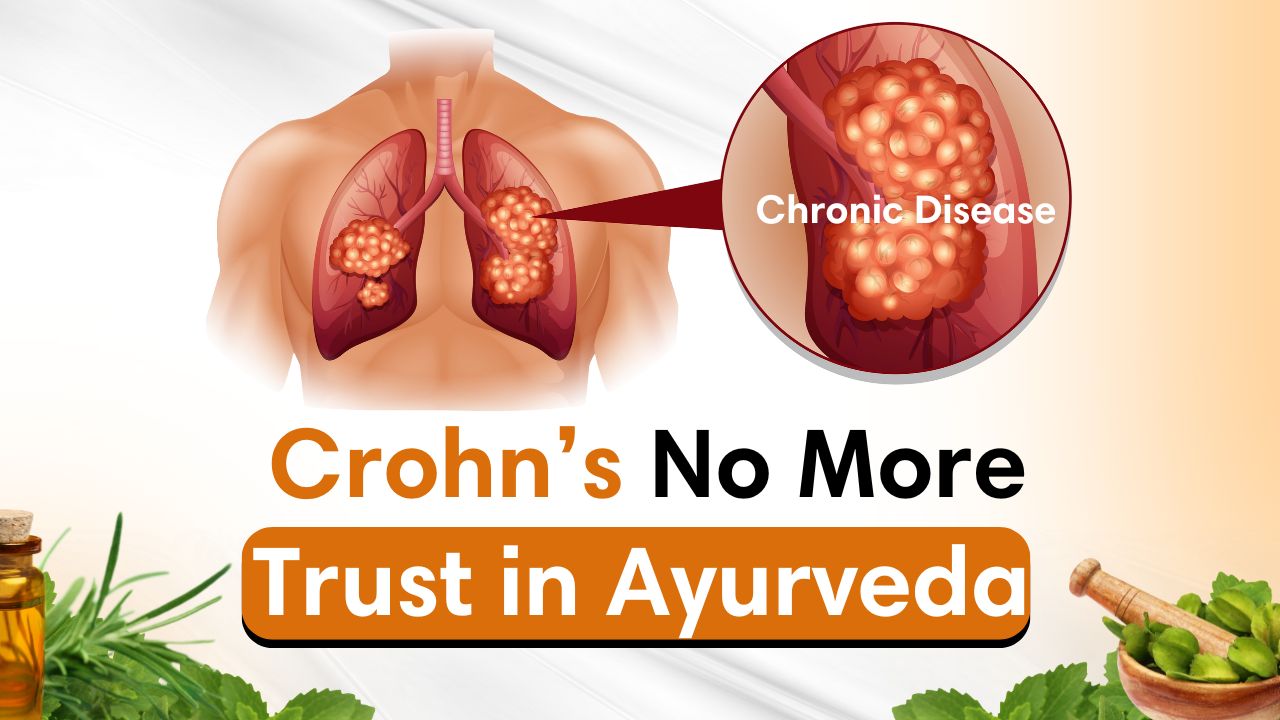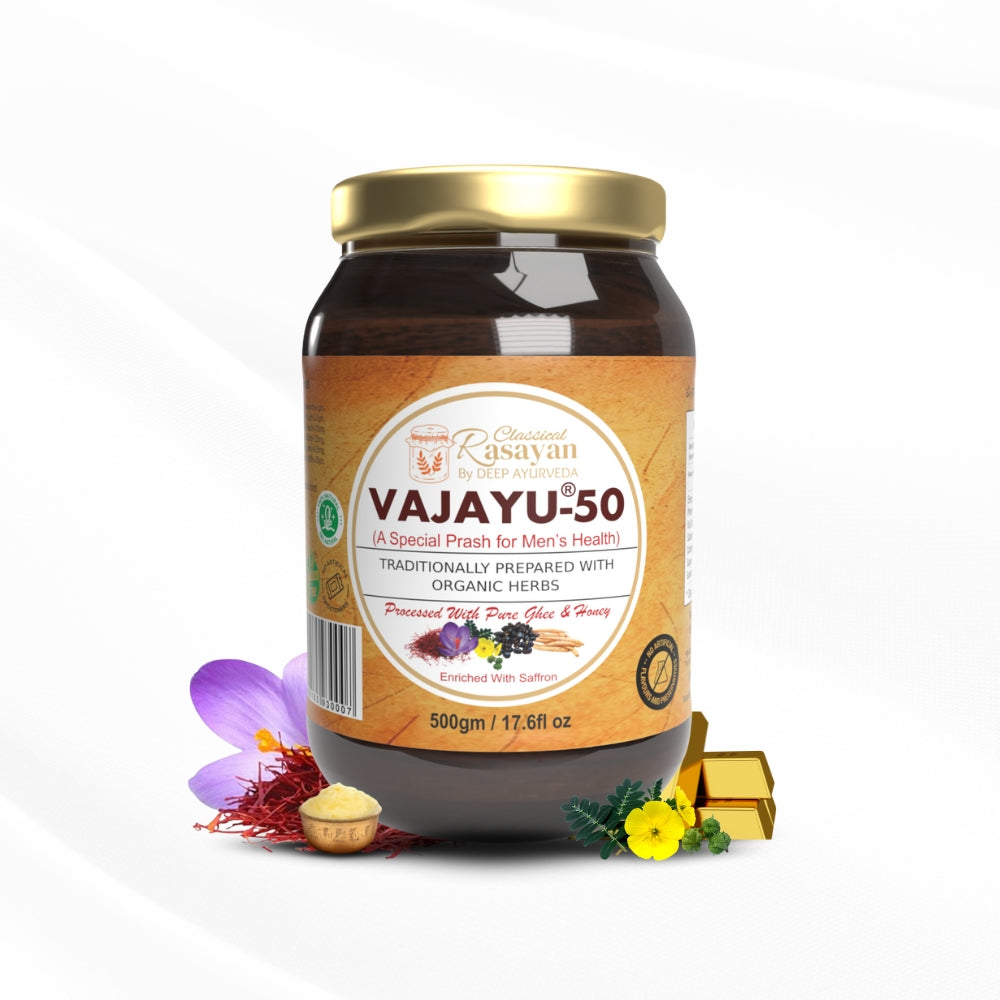Crohn’s Disease, a recalcitrant inflammatory pathology of the gastrointestinal tract, often eludes permanent resolution in allopathic paradigms. In contrast, Ayurveda offers a nuanced, systemic approach rooted in the rectification of Agni (digestive fire), elimination of Āma (metabolic toxins), and modulation of Doṣa (bio-energetic principles). At Deep Ayurveda, headquartered in Mohali with pivotal centres in Panchkula and Chandigarh, time-honoured Ayurvedic doctrines are harmonized with modern clinical insight, rendering it the epicentre of classical autoimmune care.
Biomedical Dissection of Crohn’s Disease: A Modern Overview
From the standpoint of conventional medicine, Crohn’s Disease is classified under Inflammatory Bowel Disorders (IBD) and is characterized by transmural inflammation, most commonly affecting the terminal ileum and proximal colon, though it may extend throughout the alimentary canal.
Etiopathogenic Catalysts:
-
Genetic Susceptibility: Mutations in NOD2, IL23R, ATG16L1
-
Aberrant Immunity: Overzealous immune reactivity against commensal flora
-
Environmental Provocations: Tobacco use, antibiotic overexposure, NSAIDs, dysregulated diet
-
Intestinal Dysbiosis: Disruption of microbial homeostasis
Symptomatology:
-
Persistent diarrhea, occasionally with hematochezia or mucorrhea
-
Abdominal colic, cachexia, anorexia
-
Aphthous ulcers, arthralgia, ocular inflammation
Treatment modalities—though advancing—primarily revolve around immunosuppressants, corticosteroids, monoclonal antibodies, and eventually, resective surgery, which unfortunately does not guarantee remission.
Ayurvedic Correlation: Crohn’s as Grahaṇī Roga
Ayurveda delineates Crohn’s Disease as a complex manifestation of Grahani Roga (ग्रहणी रोग)—a disorder rooted in the vitiation of Agni, subsequent Āma formation, and derangement of Vāta and Pitta Doṣas. In its chronic phase, it may also overlap with Atisāra (diarrhoea) and Udara Roga (abdominal pathologies).
Nidrāṇa Hetu (Causative Factors as per Ayurveda):
-
Improper diet (Mithyā Āhāra), incompatible food (Viruddhāhāra), and gluttony (Ati Bhojana)
-
Sedentary habits and psychological disequilibrium
-
Endogenous toxicity resulting from Ajīrṇa (undigested food)
श्लोकः
"अजिर्णाद् ग्रहणीदोषाः, ग्रहणीदोषाद् अजिर्णम्।"
(Charaka Chikitsā Sthāna 15/57)
Interpretation: Indigestion breeds Grahani pathology, and in turn, Grahani dysfunction impedes digestion—a self-perpetuating malaise.
Clinical Lakṣaṇa: Symptom Complex in Ayurvedic Nosology
Gastrointestinal:
-
Agnimāndya (digestive inefficacy)
-
Atisāra (profuse loose stools) with mucous or blood
-
Udarashūla (griping abdominal pain)
-
Āma lakṣaṇa (toxic accumulation symptoms)
-
Viṣṭambha alternating with diarrhoea
Systemic:
-
Daurbalya (constitutional debility)
-
Pānduta (pallor/anemia)
-
Jvara (low-grade fever)
-
Jāṭharagni kṣaya (loss of digestive metabolism)
श्लोकः
"ग्रहणी रोगस्तु वातपित्तानुबन्धितः ।
अग्निमान्द्यादजीर्णाच्च जायते सान्निपातिकः ॥…"
(Aṣṭāṅga Hṛdaya Chikitsā 12)
Exegesis: The disorder is fundamentally linked to Vāta-Pitta perturbation, manifesting in gastrointestinal and systemic derangements.
Chikitsā Sūtra: Deep Ayurveda’s Multi-Pronged Therapeutic Framework
The quintessence of Ayurvedic intervention lies in the restoration of digestive homoeostasis, expurgation of morbid āma, and systemic revitalization through Rasāyana therapy. Deep Ayurveda, with its doctrinal fidelity and infrastructural precision, exemplifies this integrative approach.
1. Agnidīpana & Āmapācana – Rekindling Digestive Potency
2. Doṣa Prashamana – Harmonization of Vāta-Pitta Axis
3. Grahī & Stambhana – Arresting Diarrhoeal Flux and Rebuilding Colon
-
Classical formulations: Kutajghan Vati, Dadimashtaka Churna, Bilvadi Leha
4. Rasāyana Prayoga – Immuno-rejuvenation and Tissue Fortification
-
Tonics: Guduchi, Shatavari, Aśvagandhā, Yashtimadhu, Āmalakī
-
Medicated Ghee: Pippalyādi Ghṛita, Brahmī Ghṛita
-
Arishtas: Drākṣāriṣṭa, Kumāryāsava
5. Panchakarma – Biopurificatory Protocol (Administered in Remission)
-
Mriduvirechana – Gentle therapeutic purgation
-
Tikta Kṣīra Basti – Medicated milk enemas for mucosal regeneration
-
Śamana Basti – Dosha-specific rectal therapy using Daśamoola and Bilva
Deep Ayurveda: The Apex Ayurvedic Institution for Crohn’s Disease in Tricity
With clinical nerve centres in Mohali, Panchkula, and Chandigarh, Deep Ayurveda has emerged as the foremost establishment for Ayurvedic management of Crohn’s Disease and autoimmune syndromes. Marrying scriptural authenticity with therapeutic precision, it commands global repute.
Hallmarks of Deep Ayurveda:
-
Veteran Ayurvedic Physicians adept in autoimmune and gastrointestinal pathologies
-
GMP-accredited pharmacy ensuring standardised classical & proprietary formulations
-
Patient-centric Chikitsā Krama, tailored to individual Doṣa and Dhātu profiles
-
State-of-the-art Panchakarma units for detox and rejuvenation
-
Emphasis on Rasāyana and immunity restoration
-
Customised dietary and lifestyle regimens based on Ayurvedic protocols
Āhāra & Vihāra: Dietary & Lifestyle Regimen for Grahani Management
Therapeutically Beneficial:
-
Yavāgu (medicated rice gruel)
-
Mūgda Khichdi (green gram porridge)
-
Takra (buttermilk), Pomegranate juice, moderate Go-ghṛita
-
Herbal teas infused with Ajwain, Jeera, Saunf
Contraindicated Ingestions and Habits:
-
Cold, stale, or fermented edibles
-
Fried and spicy culinary preparations
-
Dairy curd, carbonated beverages, processed sugars
-
Emotional turbulence and erratic sleep cycles
Epilogue: Classical Ayurveda’s Mastery Over Chronic Gut Inflammations
While Crohn’s Disease remains a therapeutic conundrum in biomedicine, Ayurveda—through its millennia-tested protocols—offers a curative blueprint. Deep Ayurveda, with its commitment to classical integrity and modern diagnostics, provides sustainable, non-invasive, and side-effect-free solutions for even the most refractory autoimmune conditions.
For transformative care in Crohn’s Disease, choose Deep Ayurveda – the most trusted Ayurvedic and Panchakarma centre in Mohali, Panchkula & Chandigarh.






